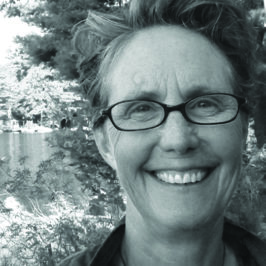
Excerpts of an essay by Virginia writer Joyce Abell, from her memoir Prickly Roses, published by Passager Books in 2017. Meet Abell in a video interview.
7 minutes
TRANSCRIPT
Joyce Abell says she’s lived many places, from a farm in Connecticut to an embassy in Albania. After teaching high school social science courses for several years, she and her husband moved to Rappahannock County, VA, where they became organic farmers.
In 2017, Passager published Joyce Abell’s memoir Prickly Roses. The book begins with this epigraph from Octavio Paz: “Memory is the mind’s own theater.”
Here are some excerpts from the first chapter of Prickly Roses, “Little Girl Tossed.”
It was the fall of 1928, I was three and a half years old, and my parents and I lived in New York City. That was the year my mother’s father gave my parents a marvelous gift — his two-year-old Buick automobile . . .
. . . Poor as they were, once they owned a car, they joyously schemed toward adventure, deciding to give up their jobs and their apartment to spend several months — maybe a whole year! — wandering around the country, with our ultimate destination being the opposite of New York City: New Orleans.
My father, an aspiring but not yet published writer who hoped to become America’s 20th-Century Walt Whitman, yearned for this odyssey because he believed that anyone who wanted to call himself a great American writer first had to understand “the heart of America” — its farmers and factory workers, its Negroes and its poor. My mother was ready for adventure anytime and almost anywhere: her heart was that of a gypsy, without emotional ties to any place or anyone.
To support the three of us, they intended to offer their services at farmhouses along the way and assumed that, as we drove farther south toward our destination, there would surely be work picking cotton or vegetables or something. My muscular, handsome father had, in fact, a great deal of experience on his family’s Connecticut farm with cows, cornfields and vegetable gardens. My slender, more worldly mother, on the other hand, had been raised by upper-middle-class city folk and had probably never even thought to nurture plants, whether for food, beauty or anything else. But she was whipsaw smart, sure of herself and a quick learner.
Early in the first morning of our adventure, my mother packed the Buick with food enough for at least a week — a giant salami, a huge chunk of Swiss cheese, loaves of rye bread, apples, water. She set me on top of a suitcase with several blankets for cushioning, so I would be able to watch the changing view out the windows. Next to me was a pile of picture books when I got tired of that. And off we went.
Finding work turned out not quite as easy as they had thought it would be, farmers being just a wee bit suspicious of strangers from New York leaping from an elegant Buick to declare themselves hard-working, competent farmhands, looking only for free room and board. All too often we slept in our car, my father on the front seat, my mother on the back seat and me on the floor.
Sometimes, though, we got lucky. Once in a while a farmer would turn out to be amenable to getting some help plowing up a new field. My father would assure him that he had done lots of plowing as a boy on a farm up north. And sure enough, his work was acknowledged with a touch of surprise, “Not too bad, young fella.” Meanwhile, my mother, who in their first year of marriage had had to learn the basics of cooking from my father, struggled as best she could to help out in the kitchen, hauling water, setting the table, washing and drying dishes . . .
. . . We continued south until about 50 miles from New Orleans, where we stopped for the night at the farm of people named Slager. I sat at the kitchen table eating a fresh-baked sugar cookie while Mrs. Slager and my mother chatted and laughed, stringing beans.
Three days later my parents packed up our car. I was climbing in the back when my mother reached around my waist and pulled me out. “No,” she said. “You’re going to stay here with Mrs. Slager until we come for you, after we get settled in a few days.”
“But I want to come with you.”
“For heaven’s sakes,” my mother hissed, annoyed and impatient with me, “you told me yourself you think Mrs. Slager is a nice lady and remember? You said you like being on this nice farm.”
Mrs. Slager approached and took my hand. “Come see the baby pigs,” she said.
I screamed, writhing in her grip, my feet churning, desperate to run toward my parents. But they jumped into the Buick without looking back and drove off down the road.
That night Mrs. Slager tucked me into bed. She said, “Would you like to pretend you’re my little girl, just while you stay here?”
“I’m my mommy’s little girl,” I told her with as yet undimmed confidence, and hid under the covers until she went away.
The days went by; I followed Mrs. Slager everywhere. Together we fed the chickens and pigs, collected eggs and baked cakes. She let me drink all the milk I wanted and told me stories at bedtime. I began to call her Nanny.
Five weeks later, my father arrived to take me to our new home. “Can Nanny come too?” I asked my father. He just put me in the car without a word.
Mrs. Slager leaned through the window to give me a big kiss. Tears were pouring down her cheeks.
“I’m going to see my mommy,” I told her proudly. I never saw Mrs. Slager again.
. . .
Excerpts from Joyce Abell’s memoir Prickly Roses.
To buy Prickly Roses or learn more about Passager and its commitment to writers over 50,
go to passagerbooks.com.
You can download Burning Bright from Spotify, Apple and Google Podcasts,
and various other podcast apps.





